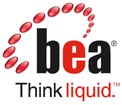Active Directory (AD) is a directory service developed by Microsoft for Windows domain networks. Windows Server operating systems include it as a set of processes and services. Originally, only centralized domain management used Active Directory. However, it ultimately became an umbrella title for various directory-based identity-related services.

BEA Systems, Inc. was a company that specialized in enterprise infrastructure software products, which was wholly acquired by Oracle Corporation on April 29, 2008.
Enterprise information integration (EII) is the ability to support a unified view of data and information for an entire organization. In a data virtualization application of EII, a process of information integration, using data abstraction to provide a unified interface for viewing all the data within an organization, and a single set of structures and naming conventions to represent this data; the goal of EII is to get a large set of heterogeneous data sources to appear to a user or system as a single, homogeneous data source.
Single sign-on (SSO) is an authentication scheme that allows a user to log in with a single ID to any of several related, yet independent, software systems.
Identity management (IdM), also known as identity and access management, is a framework of policies and technologies to ensure that the right users have the appropriate access to technology resources. IdM systems fall under the overarching umbrellas of IT security and data management. Identity and access management systems not only identify, authenticate, and control access for individuals who will be utilizing IT resources but also the hardware and applications employees need to access.
In computing, the term virtual directory has a couple of meanings. It may simply designate a folder which appears in a path but which is not actually a subfolder of the preceding folder in the path. However, this article will discuss the term in the context of directory services and identity management.
A metadirectory system provides for the flow of data between one or more directory services and databases, in order to maintain synchronization of that data, and is an important part of identity management systems. The data being synchronized typically are collections of entries that contain user profiles and possibly authentication or policy information. Most metadirectory deployments synchronize data into at least one LDAP-based directory server, to ensure that LDAP-based applications such as single sign-on and portal servers have access to recent data, even if the data is mastered in a non-LDAP data source.
A federated identity in information technology is the means of linking a person's electronic identity and attributes, stored across multiple distinct identity management systems.
Enterprise software, also known as enterprise application software (EAS), is computer software used to satisfy the needs of an organization rather than individual users. Such organizations include businesses, schools, interest-based user groups, clubs, charities, and governments. Enterprise software is an integral part of a computer-based information system.

Uniface is a low-code development and deployment platform for enterprise applications that can run in a large range of runtime environments, including mobile, mainframe, web, Service-oriented architecture (SOA), Windows, Java EE, and .NET. Uniface is used to create mission-critical applications.
A service delivery platform (SDP) is a set of components that provides a service(s) delivery architecture for a type of service delivered to consumer, whether it be a customer or other system. Although it is commonly used in the context of telecommunications, it can apply to any system that provides a service. Although the TM Forum (TMF) is working on defining specifications in this area, there is no standard definition of SDP in industry and different players define its components, breadth, and depth in slightly different ways.
Oracle Fusion Middleware consists of several software products from Oracle Corporation. FMW spans multiple services, including Java EE and developer tools, integration services, business intelligence, collaboration, and content management. FMW depends on open standards such as BPEL, SOAP, XML and JMS.
Microsoft Identity Integration Server (MIIS) is an identity management (IdM) product offered by Microsoft. It is a service that aggregates identity-related information from multiple data-sources. The goal of MIIS is to provide organizations with a unified view of a user's/resources identity across the heterogeneous enterprise and provide methods to automate routine tasks.

WaveMaker is an enterprise-grade Java low-code development platform for building software applications and platforms. WaveMaker Inc. is headquartered in Mountain View, California. For enterprises, WaveMaker is a low-code platform that aims to accelerate their app development and IT modernization efforts. For ISVs, it is a consumable low-code component that can sit inside their product and offer customizations.

Microsoft Azure, often referred to as Azure, is a cloud computing platform run by Microsoft. It offers access, management, and the development of applications and services through global data centers. It also provides a range of capabilities, including software as a service (SaaS), platform as a service (PaaS), and infrastructure as a service (IaaS). Microsoft Azure supports many programming languages, tools, and frameworks, including Microsoft-specific and third-party software and systems.
Data virtualization is an approach to data management that allows an application to retrieve and manipulate data without requiring technical details about the data, such as how it is formatted at source, or where it is physically located, and can provide a single customer view of the overall data.

OpenNebula is an open source cloud computing platform for managing heterogeneous data center, public cloud and edge computing infrastructure resources. OpenNebula manages on-premise and remote virtual infrastructure to build private, public, or hybrid implementations of Infrastructure as a Service and multi-tenant Kubernetes deployments. The two primary uses of the OpenNebula platform are data center virtualization and cloud deployments based on the KVM hypervisor, LXD/LXC system containers, and AWS Firecracker microVMs. The platform is also capable of offering the cloud infrastructure necessary to operate a cloud on top of existing VMware infrastructure. In early June 2020, OpenNebula announced the release of a new Enterprise Edition for corporate users, along with a Community Edition. OpenNebula CE is free and open-source software, released under the Apache License version 2. OpenNebula CE comes with free access to patch releases containing critical bug fixes but with no access to the regular EE maintenance releases. Upgrades to the latest minor/major version is only available for CE users with non-commercial deployments or with significant open source contributions to the OpenNebula Community. OpenNebula EE is distributed under a closed-source license and requires a commercial Subscription.
MaXware AS , was a provider of identity management, virtual directory and federation solutions. The company was located in Norway, the United Kingdom, Australia and the United States.

Bitium was a developer of the cloud service Bitium, which provided single sign-on and identity management for software as a service (SaaS) cloud-based applications before its merger into Google Cloud. Bitium allowed end users to access all of their cloud software accounts using a single set of login credentials. The product could integrate with cloud apps using SAML for enhanced security.

Oracle Cloud is a cloud computing service offered by Oracle Corporation providing servers, storage, network, applications and services through a global network of Oracle Corporation managed data centers. The company allows these services to be provisioned on demand over the Internet.







